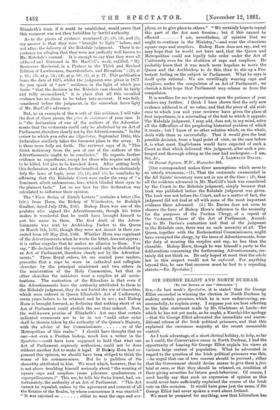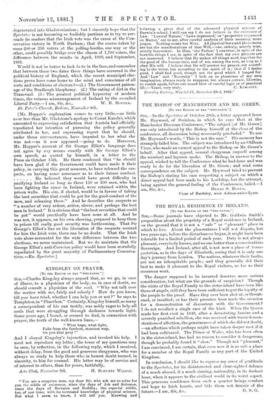SIR GEORGE ELLIOT AND NORTH DURHAM.
[To THE EDITOR OF THE " SPECTATOR:] SIR,—In last week's Spectator, it is stated that Sir George Elliot succeeded in winning the election in North Durham by making certain promises, which he is now endeavouring, un- successfully, to explain away. I suppose you are here referring to the false statement made by Mr. Gladstone at Leeds—for which he has not yet made, as he ought, a Karolyi-like apology
— that Sir George Elliot advocated the immediate and uncon- ditional release of the Irish political prisoners, and that this explained the enormous majority at the recent memorable contest: As I took advantage, of a short clerical holiday, to help, as far as I could, the Conservative cause in North Durham, I had the opportunity of hearing Sir George Elliot explain his views at various large centres of population. What he advocated in regard to the question of the Irish political prisoners was this, — he urged that one of two courses should be pursued ; either that the Government should devise means to give them a fair trial at once, or that they should be released, on condition of their giving securities for future good-behaviour. Of course, I need hardly say that such an expression of opinion as this would never have sufficiently explained the course of the Irish vote on this occasion. It would have gone just the same, if Sir George Elliot had never spoken a word about Ireland.
We must be prepared for anything, now that Liberalism has
degenerated into Gladstonianism ; but I sincerely hope that the Spectator is not becoming so foolishly partisan as to try to per- suade its readers that the Irish vote was the cause of the Con- servative victory in North Durham ; that the course taken by some 200 or 250 voters at the polling-booths, one way or the other, could possibly bridge over the chasm of 1,700 voters, the difference between the results in April, 1880, and September, 1881.
Would it not be better to look fats in the face, and remember that between these two dates three things have occurred in the political history of England, which the recent municipal elec- tions prove have come home to the mind and conscience of all sorts and conditions of electors P—(L) The Government patron- age of the Bradlangh blasphemy. (2.) The eating of dirt in the Transvaal. (3.) The greatest political hypocrisy of modern times, the ruinous mismanagement of Ireland by the so-called [Mr. Hopper's explanation comes to very little,—as little as or less than Mr. Gladstone's apology to Count Karolyi, which amounted to expressing satisfaction that Austria had officially repudiated her intention of pursuing the policy generally attributed to her, and expressing regret that he should, under those circumstances, have imputed to her what she was not—as it now appeared—going to do. Moreover, Mr. Hopper's account of Sir George Elliot's language does not agree by auy means exactly with Sir George Elliot's own speech, as quoted by himself, in a letter to the Press on October 15th. He there confessed that "he should have been glad if the Government could have made it their policy, in carrying this great measure, to have released the sus- pects, on having some assurance as to their future conduct.
• He believed they would have great difficulty in pacifying Ireland so long as these 150 or 200 men, who had been fighting the cause in Ireland, were retained within the prison walls. His aim, if elected, would be in favour of taking the best securities that could be got for the good-conduct of the men, and releasing them." And he describes the suspects as -" a number of very ardent, active, clever, and perhaps the best men in Ireland." It is obvious that "the best securities that could be got" would practically have been none at all. And he was not, it appears, on his own showing, prepared to keep them in prison till really good security was forthcoming. That Sir George's Elliot's line on the liberation of the suspects secured for him the Irish vote, there can be no doubt. That the Irish vote alone accounted for the wide difference between the two elections, we never maintained. But we do maintain that Sir George Elliot's anti-Coercion policy would have been scornfully repudiated by the great majority of Parliamentary Conserva- tives.—En. Spectator.]



































 Previous page
Previous page